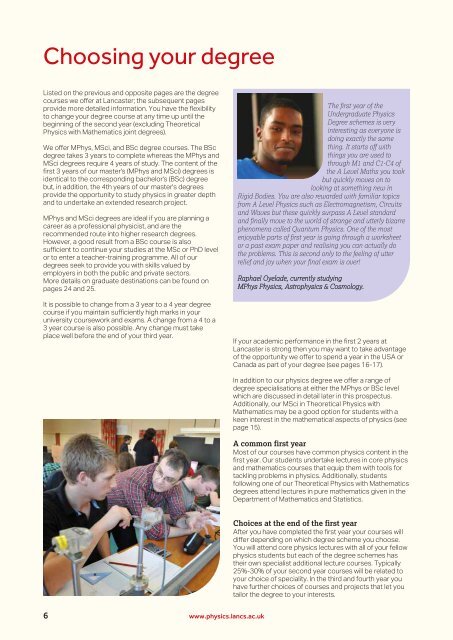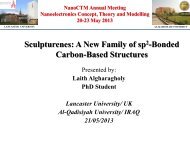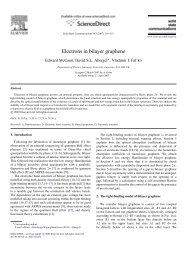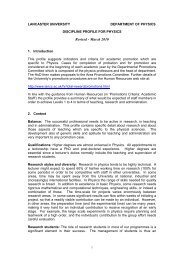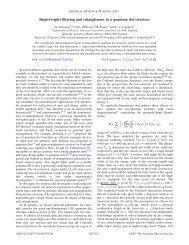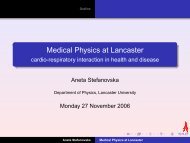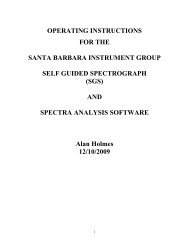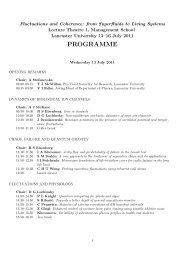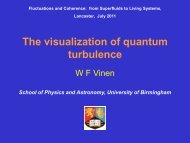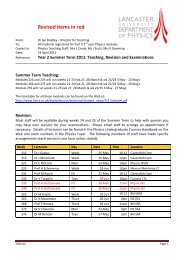PDF to download - Physics at Lancaster University
PDF to download - Physics at Lancaster University
PDF to download - Physics at Lancaster University
You also want an ePaper? Increase the reach of your titles
YUMPU automatically turns print PDFs into web optimized ePapers that Google loves.
Choosing your degreeListed on the previous and opposite pages are the degreecourses we offer <strong>at</strong> <strong>Lancaster</strong>; the subsequent pagesprovide more detailed inform<strong>at</strong>ion. You have the flexibility<strong>to</strong> change your degree course <strong>at</strong> any time up until thebeginning of the second year (excluding Theoretical<strong>Physics</strong> with M<strong>at</strong>hem<strong>at</strong>ics joint degrees).We offer MPhys, MSci, and BSc degree courses. The BScdegree takes 3 years <strong>to</strong> complete whereas the MPhys andMSci degrees require 4 years of study. The content of thefirst 3 years of our master's (MPhys and MSci) degrees isidentical <strong>to</strong> the corresponding bachelor's (BSc) degreebut, in addition, the 4th years of our master's degreesprovide the opportunity <strong>to</strong> study physics in gre<strong>at</strong>er depthand <strong>to</strong> undertake an extended research project.MPhys and MSci degrees are ideal if you are planning acareer as a professional physicist, and are therecommended route in<strong>to</strong> higher research degrees.However, a good result from a BSc course is alsosufficient <strong>to</strong> continue your studies <strong>at</strong> the MSc or PhD levelor <strong>to</strong> enter a teacher-training programme. All of ourdegrees seek <strong>to</strong> provide you with skills valued byemployers in both the public and priv<strong>at</strong>e sec<strong>to</strong>rs.More details on gradu<strong>at</strong>e destin<strong>at</strong>ions can be found onpages 24 and 25.It is possible <strong>to</strong> change from a 3 year <strong>to</strong> a 4 year degreecourse if you maintain sufficiently high marks in youruniversity coursework and exams. A change from a4<strong>to</strong>a3 year course is also possible. Any change must takeplace well before the end of your third year.The first year of theUndergradu<strong>at</strong>e <strong>Physics</strong>Degree schemes is veryinteresting as everyone isdoing exactly the samething. It starts off withthings you are used <strong>to</strong>through M1 and C1-C4 ofthe A Level M<strong>at</strong>hs you <strong>to</strong>okbut quickly moves on <strong>to</strong>looking <strong>at</strong> something new inRigid Bodies. You are also rewarded with familiar <strong>to</strong>picsfrom A Level <strong>Physics</strong> such as Electromagnetism, Circuitsand Waves but these quickly surpass A Level standardand finally move <strong>to</strong> the world of strange and utterly bizarrephenomena called Quantum <strong>Physics</strong>. One of the mostenjoyable parts of first year is going through a workshee<strong>to</strong>r a past exam paper and realising you can actually dothe problems. This is second only <strong>to</strong> the feeling of utterrelief and joy when your final exam is over!Raphael Oyelade, currently studyingMPhys <strong>Physics</strong>, Astrophysics & Cosmology.If your academic performance in the first 2 years <strong>at</strong><strong>Lancaster</strong> is strong then you may want <strong>to</strong> take advantageof the opportunity we offer <strong>to</strong> spend a year in the USA orCanada as part of your degree (see pages 16-17).In addition <strong>to</strong> our physics degree we offer a range ofdegree specialis<strong>at</strong>ions <strong>at</strong> either the MPhys or BSc levelwhich are discussed in detail l<strong>at</strong>er in this prospectus.Additionally, our MSci in Theoretical <strong>Physics</strong> withM<strong>at</strong>hem<strong>at</strong>ics may be a good option for students with akeen interest in the m<strong>at</strong>hem<strong>at</strong>ical aspects of physics (seepage 15).A common first yearMost of our courses have common physics content in thefirst year. Our students undertake lectures in core physicsand m<strong>at</strong>hem<strong>at</strong>ics courses th<strong>at</strong> equip them with <strong>to</strong>ols fortackling problems in physics. Additionally, studentsfollowing one of our Theoretical <strong>Physics</strong> with M<strong>at</strong>hem<strong>at</strong>icsdegrees <strong>at</strong>tend lectures in pure m<strong>at</strong>hem<strong>at</strong>ics given in theDepartment of M<strong>at</strong>hem<strong>at</strong>ics and St<strong>at</strong>istics.Choices <strong>at</strong> the end of the first yearAfter you have completed the first year your courses willdiffer depending on which degree scheme you choose.You will <strong>at</strong>tend core physics lectures with all of your fellowphysics students but each of the degree schemes hastheir own specialist additional lecture courses. Typically25%-30% of your second year courses will be rel<strong>at</strong>ed <strong>to</strong>your choice of speciality. In the third and fourth year youhave further choices of courses and projects th<strong>at</strong> let youtailor the degree <strong>to</strong> your interests.6www.physics.lancs.ac.uk


